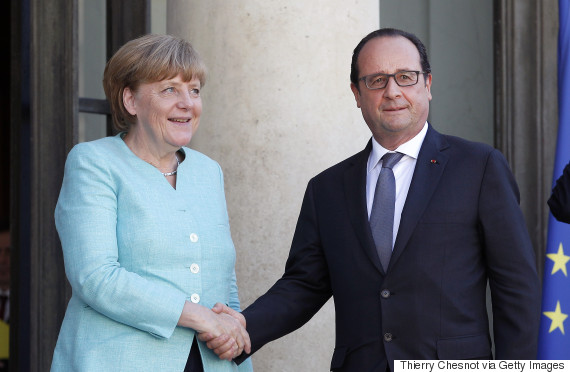The creditors of nations long enforced their claims by the cannons of government and, in some cases, the cannons of companies. They called it gunboat diplomacy, and it cared little for the fate of those at the wrong end of the guns.
While the modern financial services era largely silenced the cannons, the political institutions that replaced them still press creditors' claims ahead of all other obligations a nation might have.
On Sunday, Greek voters stood up and said no to this arrangement. If Greece gets its way, the future of its people's pensions, infrastructure, health care and education will count at least as much as the payment of its debt.
Greece has long said it, and since Sunday's referendum, some other European leaders are saying it: Greece needs debt relief.
 Greek citizens celebrate the "no" victory in a July 5 referendum on a proposed debt deal. (Photo: Louisa Gouliamaki via Getty Images)
Greek citizens celebrate the "no" victory in a July 5 referendum on a proposed debt deal. (Photo: Louisa Gouliamaki via Getty Images)
Amid all the spiteful statements and renewed threats from Greece’s creditors, European Commission Vice President Valdis Dombrovskis indicated on Monday that Greece’s creditors are “ready to look” at debt relief in new negotiations.
Greek Prime Minister Alexis Tsipras confused some observers when his government announced Monday that those negotiations would be based on the last deal offered by European Commission President Jean-Claude Juncker -- the same proposal that Greece’s voters rejected on Sunday at the urging of the ruling Syriza party.
But Greece’s negotiating position becomes clearer if the government also doubles down on its demand for substantial debt relief. Tsipras took to Twitter after the referendum results came in to insist that the “issue of our debt will now be on the table.”
A joint statement by the leaders of almost all of Greece’s political parties (only the Communist Party did not sign it) addressed debt relief, though it was a little less insistent. The leaders’ shared goals for negotiations included, “A commitment towards the beginning of substantive discussion on dealing with the problem of the sustainability of the Greek public debt.”
Economists including Paul Krugman and Jeffrey Sachs have long identified the need for debt restructuring as the fundamental issue of the Greek crisis. To pay off its current debt, these economists say, Greece would have to achieve annual fiscal savings that would severely limit the country's ability to grow its way out of financial duress. As Olivier Blanchard, chief economist of the International Monetary Fund, has noted, it would only be possible to loosen the annual fiscal targets, now or in the future, if Greece’s long-term debts were reduced.
But debt forgiveness must come from individual eurozone nations, who hold the majority of Greece's debt. Even though most of those debts to eurozone nations begin coming due only in 2020, the sheer size of the debt burden is already scaring away new investment. And past Greek proposals suggest that it wants to use debt relief from eurozone nations to pay off more immediate obligations to the IMF and the European Central Bank.
Greece’s demands for debt relief were buoyed by a report released by the IMF last week showing that Greece’s debt is unsustainable. Tsipras has cited the report in his calls for debt relief:
Still, hardline creditors in Germany and some smaller European countries are publicly resisting the idea of debt relief -- or anything else that could be construed as a concession to Greece. In fact, Reuters reported that European leaders tried to stop the IMF from releasing its report. They did so even though German Chancellor Angela Merkel had privately admitted in 2011 that she did not believe Greece would ever be able to pay off its debts.
The additional democratic pressure from the referendum notwithstanding, the creditors still have their metaphorical gunboats pointed at Greece. Specifically, Greece needs the European Central Bank to raise the limit on funds available to the country through the Emergency Liquidity Assistance program. Without more cash, Greece’s banks will have to remain closed for all but minimal cash withdrawals -- and are projected to run out of money altogether at some point this week. That would put Greece in uncharted waters, possibly forcing it to print a parallel currency in order to have enough money to survive.
If the progress of Greece’s referendum has demonstrated anything though, it is that the creditors may be bluffing on their threats. Ahead of the vote on Sunday, European leaders were warning that a victory for “no” would be seen as a decision to leave the euro monetary union -- or even the European Union altogether. But soon after the referendum’s results were announced, Merkel and French President François Hollande agreed to respect the vote and return to the negotiating table.
 Angela Merkel meets with François Hollande on July 6 in Paris to discuss future talks with Greece. (Photo: Thierry Chesnot via Getty Images)
Angela Merkel meets with François Hollande on July 6 in Paris to discuss future talks with Greece. (Photo: Thierry Chesnot via Getty Images)
Italian Prime Minister Matteo Renzi, who had tough words for Greece ahead of the referendum, also struck a note of reconciliation.
“When you see a pensioner crying in front of a bank, you realize that a country as important for the world and its culture as Greece cannot end up like this," Renzi said, referring to an Agence-France Presse photo. “We must start talking to each other again -- no one knows that more than Angela Merkel."
Related
Before You Go








